- Home
- Patricia Highsmith
The Boy Who Followed Ripley Page 3
The Boy Who Followed Ripley Read online
Page 3
Heloise’s third performance of the Invention concluded with a delicately ringing Schlussakkord.
Was the boy called Billy going to look him up again? Tom thought he would.
Tom practiced his Scarlatti after lunch. He could now practice with concentration for thirty minutes or more without taking a break in the garden, which was progress from the original fifteen-minute session of months ago. Roger Lepetit (anything but petit, a tall plump young man, a French Schubert, Tom thought, spectacles and curly hair) said that gardening was ruinous for a pianist’s or harpsichordist’s hands, but Tom preferred to compromise: he didn’t want to give up gardening, but he could perhaps leave the wrenching of milk-wort or whatever to their part-time gardener Henri. After all, he was not aiming to become a concert harpsichordist. All life was a compromise.
By 5:15, Roger Lepetit was saying, “This is legato here. You must make an effort with the harpsichord to achieve a legato—”
The telephone rang.
Tom had been trying to achieve the correct tension, the correct degree of relaxation to do the simple piece properly. He now took a deep breath and got up, excusing himself. Heloise was upstairs, dressing to go off to her parents’, having had her lesson. Tom picked up the downstairs telephone.
Heloise had already answered upstairs, and was talking in French. Tom recognized the voice of Billy, and interrupted.
“Mr. Ripley,” Billy said. “I’ve been to Paris. You know—about the Auberge thing. Interesting—it was.” The boy sounded shy.
“You found out something?”
“A little and—since it might amuse you, I thought—if you have a few minutes around seven tonight—”
“Tonight is fine,” said Tom.
They hung up abruptly, before Tom had time to ask how the boy would get here. Well, he had gotten here before. Tom flexed his shoulders and went back to the harpsichord. He sat up straight. He fancied his next rendition of the Scarlatti piccola sonata was better.
Roger Lepetit pronounced it fluent. High praise.
The rainstorm had exhausted itself by noon, and in late afternoon the garden shone bright and clean in unusually dustless sunlight. Heloise departed, saying she would be home by midnight or before. It was a drive of an hour and a half to Chantilly. She and her mother always talked after dinner, while her father retired no later than 10:30.
“The American boy you met is coming tonight at seven,” Tom said. “Billy Rollins.”
“Oh. Of the other night, yes.”
“I’ll offer him something to eat. He might be here when you get back.”
It was of no importance, and Heloise did not reply. “Bye-bye, Tome!” she said, picking up her bouquet of long-stemmed Shasta daisies with a single red peony, almost their last. Providently she wore a raincoat over her skirt and blouse.
Tom was listening to the seven o’clock news, when the outside gate bell rang. Tom had told Mme. Annette he was expecting a caller at seven, and Tom intercepted her in the living room and said he would let his friend in himself.
Billy Rollins was walking across the graveled stretch between the gates, which had been open, and the front door. Now he wore gray flannel trousers, a shirt, and jacket. He carried something flat in a plastic bag under his arm.
“Evening, Mr. Ripley,” he said, smiling.
“Evening. Come in. How did you get here—so punctually?”
“Taxi. Blowing it today,” said the boy, wiping his shoes on the doormat. “This is for you.”
Tom opened the plastic bag and pulled out a record of Schubert’s Lieder sung by Fischer-Dieskau, a new recording of which Tom had recently heard. “Thank you very much. Just what I wanted, as they say. But I mean it, Billy.”
The boy’s clothes looked immaculate, in contrast to the other evening. Mme. Annette entered to ask what they wished. Tom introduced them.
“Sit down, Billy. A beer or something else?”
Billy sat down on the sofa. Mme. Annette went to fetch beer to be added to the bar cart’s offerings.
“My wife went to visit her parents,” Tom said. “It’s a usual Friday evening date with her.”
Tonight Mme. Annette was attempting Tom’s gin and tonic, with a slice of lemon. The more work Mme. Annette had, the happier she was, and Tom had no complaint about the drinks she made for him.
“You had a harpsichord lesson today?” Billy had noticed the music books on the open harpsichord.
Tom said yes, Scarlatti, and for his wife a Bach Invention. “Much more fun than playing bridge in the afternoon.” Tom was grateful that Billy did not suggest that he play something. “Now your Paris trip—our four-footed friends.”
“Yes,” said Billy, tilting his head back as if he were thinking carefully before beginning. “I spent Wednesday morning making sure the Auberge really didn’t exist. I asked in a café, also at a garage which said they’d had a couple of people asking too—and I even asked the police in Veneux. They said they’d never heard of it, and they couldn’t find it on a detailed map. Then I asked at a big hotel there, and they’d never heard of it.”
Tom knew, the Hotel Grand Veneux, probably, a name which had always made Tom think of “the big venery,” suggesting a huge letch of some kind. Tom winced at his own thoughts. “You were pretty busy Wednesday morning, it seems.”
“Yes, and of course I worked Wednesday afternoon, because I do put in five or six hours a day for Madame Boutin.” He took a gulp of beer from his glass. “Then Thursday yesterday I went to Paris, to the eighteenth arrondissement starting with Les Abbesses Metro stop. Then Place Pigalle. I went to their post offices and asked about box two hundred and eighty-seven. That was not information for the public, they said. I asked the name of the person who was collecting, you see.” Billy smiled a little. “I was in my work clothes, and I said I wanted to give ten francs to an animal fund, and wasn’t that box number an animal fund. You’d have thought I was a crook, the way they looked at me!”
“But do you think you asked at the right post office?”
“I couldn’t tell, because all the post offices in the eighteenth—or four of them—refused to say if they had a box two eighty-seven. So I did the next best thing—the logical thing, I thought,” Billy said, looking at Tom as if he expected him to guess what he had done.
Tom couldn’t, at the moment. “What?”
“I bought some paper and a stamp, went to the next café, and wrote a letter to the Auberge saying, ‘Dear Auberge et cetera, your mimeographed establishment does not exist. I am one of the many duped—trompés, you know—’ ”
Tom nodded appreciatively.
“ ‘—and I have allied myself with other well-meaning friends of your charitable—fraud. Therefore be prepared for an invasion by the legal authorities.’ ” Billy sat forward, and there seemed to be a struggle going on in his face or mind, between amusement and righteous indignation. His cheeks had pinkened, he smiled and frowned at the same time. “I said their post box would be watched.”
“Excellent,” said Tom. “I hope they’re squirming.”
“I did hang around one promising post office, hoping.— I said to a girl behind the window, how often do they come to collect? She wouldn’t tell me. That’s typically French, of course. Not that she was trying to protect anybody necessarily.”
Tom knew. “How is it you know so much about the French? And you speak a pretty good French too, don’t you?”
“Oh—we had it in school, of course. Then—a couple of years ago I—my family spent a summer in France. Down south.”
Tom had the feeling the boy had been brought several times to France, maybe starting at the early age of five. No one learned decent French in an ordinary American high school. Tom opened another Heineken at the bar cart and brought it to the coffee table. He had decided to plunge in. “Did you read about the death of the American John Pierson—about a month ago?”
Surprise showed in the boy’s eyes for an instant, then he seemed to be trying to remember. “I thi
nk I heard something—somewhere.”
Tom waited, then said, “One of the two boys in the family disappeared. The one called Frank. The family’s worried.”
“Oh?— I didn’t know.”
Had the boy’s face gone paler? “It just occurred to me—he might be you,” Tom said.
“Me?” The boy sat forward, beer glass in hand, and his eyes left Tom and fixed on the fireplace. “I wouldn’t be working as a gardener, I think, if—”
Tom let some fifteen seconds pass. Nothing more came from the boy. “Shall we try your record? How did you know I liked Fischer-Dieskau? From the harpsichord?” Tom laughed. He switched on the hi-fi controls, which were on a shelf to the left of the fireplace.
The piano began, then Fischer-Dieskau’s light baritone came in, singing in German. Tom felt instantly more alive, happier, then he smiled, thinking of an awful deep baritone he had happened to catch on his transistor only last evening, a groaning Englishman singing in English and making Tom think of a dying water buffalo, maybe lying in mud with its feet in the air, though the words had been about a dainty Cornish maiden he had loved and lost years ago, a good many years ago, judging from the maturity of the voice. Tom suddenly laughed out loud, and realized that he was unusually tense.
“What’s funny?” asked the boy.
“I was thinking of a title I made up for a Lied. ‘My soul has not been the same since Thursday afternoon, when on opening a book of Goethe’s poems, I discovered an old laundry list.’ It goes better in German. ‘Seit Donnerstag nachmittag ist meine Seele nicht dieselbe, denn ich fand beim Durchblättern eines Bandes von Goethegedichten eine alte Wäscheliste.’ ”
The boy was laughing too—with the same kind of tension? He shook his head. “I don’t understand many German words. But it’s funny. Souls! Ha!”
The lovely music continued, and Tom lit a Gauloise and walked slowly about the living room, wondering how he should proceed. Really force it and ask to see the boy’s passport, ask to see something—such as a letter addressed to him—by way of settling the matter?
At the end of a song, the boy said, “I don’t think I want to listen to the whole side, if you don’t mind.”
“Of course not.” Tom switched the machine off. He put the record back into its sleeve.
“You were asking me—about the man called Pierson.”
“Yes.”
“What if I were to say—” The boy’s voice sank low, as if someone else in the room or maybe Mme. Annette in the kitchen might be listening. “—I’m his son who ran away?”
“Oh,” Tom said calmly, “I would say that’s your business. If you wanted to come to Europe—incognito—it’s been done before.”
The boy’s face looked relieved, a corner of his mouth twitched. But he kept silent, rolling his half-full glass between his palms.
“Except that the family is worried, it seems,” Tom said.
Mme. Annette came in. “Excuse me, Monsieur Tome, will there be—”
“Yes, I think so,” said Tom, because Mme. Annette had been about to ask if there would be two for dinner. “You can stay for a bite, can’t you, Billy?”
“Yes, I’d like to. Thank you.”
Mme. Annette smiled at the boy, more with her eyes than her lips. She liked guests, liked making them happy. “About fifteen minutes, Monsieur Tome?”
When Mme. Annette left the living room, the boy squirmed to the edge of the sofa and asked, “Can we take a look at your garden before it gets dark?”
Tom stood up. They went out through the French windows, down the few steps to grass level. The sun was sinking in the left corner of the horizon, glowing orange and pink through the pine trees. Tom sensed that the boy wanted to get farther away from Mme. Annette’s ears, but for the moment he was taken by the scenery.
“Now this has some quality—as a layout. Nice—but not too formal.”
“I can’t take credit for the design. It was here. I just try to maintain it.”
The boy bent to look at some London Pride (not blooming now), and he knew it by name to Tom’s surprise. Then he turned his attention to the greenhouse.
Here were multicolored leaves, blossoms, plants ready to be given away to friends, all in proper dampness and rich soil. The boy inhaled as if he loved it. Was this really the son of John Pierson, raised in luxury to take over the business reins—unless that was the older son’s duty? Why didn’t he talk now, in the privacy of the greenhouse? But the boy kept peering at pots, and touched one plant gently with a fingertip.
“Let’s go back,” Tom said, a bit impatient.
“Yes, sir.” The boy straightened as if he had done something wrong, and followed Tom out.
What kind of school demanded “Yes, sir” these days? A military school?
They had dinner in the alcove off the living room. The main dish was chicken with dumplings, the dumplings laid on after the boy’s telephone call this afternoon, at Tom’s request. Tom had taught Mme. Annette how to make dumplings in the American style. The boy ate well and seemed to enjoy the Montrachet also. He asked polite questions about Heloise, where did her parents live, and what were they like? Tom restrained himself from giving his real opinion of the Plissons, especially the father.
“Does your—does Madame Annette speak English?”
Tom smiled. “She doesn’t even say ‘Good morning.’ Doesn’t like English, I think. Why?”
The boy moistened his lips and leaned forward. More than a meter of table still separated them. “What if I were to tell you that I am the—the person you were speaking of—Frank.”
“Yes, you asked that before,” Tom said, realizing that Frank was feeling what he had drunk. All to the good! “You’re here—just to get away from home for a while?”
“Yes,” Frank said in an earnest way. “You won’t give me away, will you? I hope not.” He was almost whispering, trying to look at Tom steadily, but his eyes swam a little.
“Certainly not. You can trust me. You probably had your own reasons—”
“Yes. I would like to be somebody else,” the boy interrupted, “for maybe—” He stopped. “I was sorry to run off the way I did, but—but—”
Tom listened, sensing that Frank was coming out with only part of the truth, and might not come out with much more tonight. Tom felt grateful for the power of vino and its veritas. There was a limit to how much one could lie with it, at least someone as young as Frank Pierson. “Tell me about your family. Isn’t there a John Junior?”
“Yes, Johnny.” Frank twirled the stem of his wine glass. He was now staring at the middle of the table. “I took his passport. I stole it from his room. He’s eighteen, nearly nineteen. I can forge his signature—or at least well enough to get by. I don’t mean I ever tried it before—not at all till now.” Frank paused, and swayed his head as if confused by many thoughts at the same time.
“Then what did you do after you ran away?”
“I took a plane to London, stayed there for—I think five days. Then I went to France. Paris.”
“I see.— And you had enough money? You weren’t forging traveler’s checks?”
“Oh, no, I took some cash, two or three thousand. That was easy—from the house. I can open the safe, of course.”
At this moment, Mme. Annette came in to remove some dishes and to serve the strawberry—fraises de bois—shortcake with whipped cream.
“And Johnny,” Tom said to start the ball rolling again, when Mme. Annette was gone.
“Johnny’s at Harvard. On vacation now, of course.”
“And where’s the house?”
Frank’s eyes swam again, as if he were thinking, which house? “Maine. Kennebunkport.— That house?”
“The funeral was in Maine, was it? I seem to remember. You left from the Maine house?” Now Tom was surprised at the boy’s apparent shock at the question.
“Kennebunkport, yes. We’re usually there at this time of the year. The funeral was there—the cremation.”
Do you think your father killed himself, Tom wanted to ask, but he thought the question was vulgar, would be only to satisfy his curiosity, so he did not put it. “And how is your mother?” Tom asked instead, as if he knew Frank’s mother and was inquiring about her health.
“Oh, she’s—she’s rather pretty—even though she’s forty something. Blonde.”
“You get along well with her?”
“Yes, sure. She’s more cheerful than—than my father was. She likes social life. And politics.”
“Politics? What kind?”
“Republican.” Here Frank smiled and looked at Tom.
“Your father’s second wife, I think.” Tom thought he remembered that from the obituary.
“Yes.”
“And you told your mother where you are?”
“Well, no. I left a note saying I was going to New Orleans, because they know I like New Orleans. I’ve stayed before at the Hotel Monteleone—by myself. I had to walk to the bus stop from the house, otherwise Eugene—he’s the driver—would’ve driven me to the railroad station and somehow—they might’ve known I wasn’t going to New Orleans. I just wanted to get away on my own feet, so I did, and I got to Bangor, then New York, and caught a plane over.— May I?” Frank reached for a cigarette from a silver cup. “No doubt my family rang up the Monteleone, and found out I wasn’t there, so this accounts for—I know, I read it in the Trib which I buy sometimes.”
“How long after the funeral did you leave?”
Frank struggled for the exact answer. “A week—maybe eight days after.”
“Now why don’t you send your mother a cable and say you’re okay and in France and want to stay a while longer? It’s a bore to have to hide, isn’t it?” But maybe the game amused Frank, Tom thought also.
“At the moment, I happen not to want—any contact with them. I’d like to be on my own. Free.” He said it with determination.
Tom nodded. “At least now I know why your hair stands up. You used to part it on the left.”

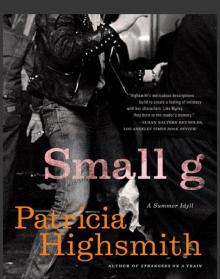 Small G: A Summer Idyll
Small G: A Summer Idyll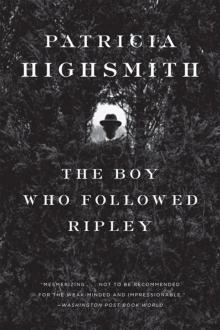 The Boy Who Followed Ripley
The Boy Who Followed Ripley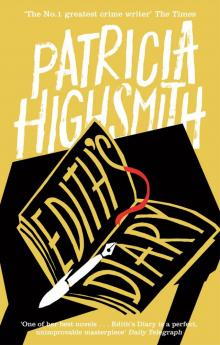 Edith's Diary
Edith's Diary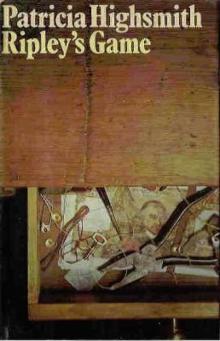 Ripley's Game
Ripley's Game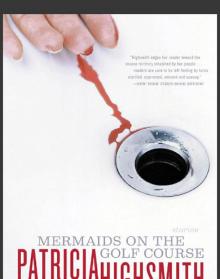 Mermaids on the Golf Course: Stories
Mermaids on the Golf Course: Stories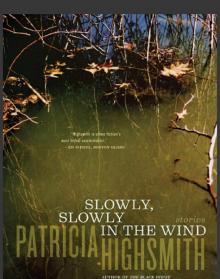 Slowly, Slowly in the Wind
Slowly, Slowly in the Wind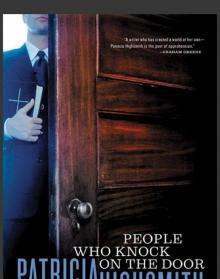 People Who Knock on the Door
People Who Knock on the Door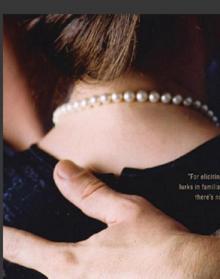 The Glass Cell
The Glass Cell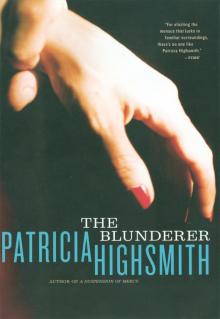 The Blunderer
The Blunderer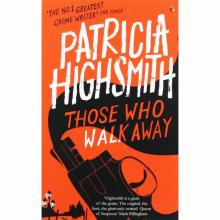 Those Who Walk Away
Those Who Walk Away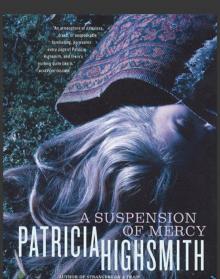 A Suspension of Mercy
A Suspension of Mercy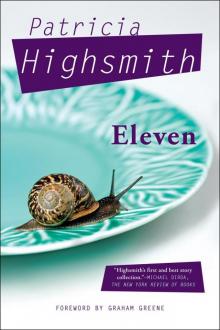 Eleven
Eleven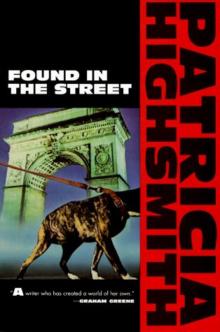 Found in the Street
Found in the Street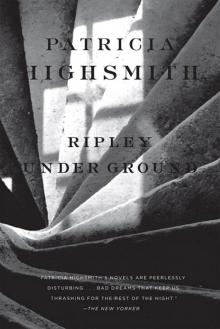 Ripley Under Ground
Ripley Under Ground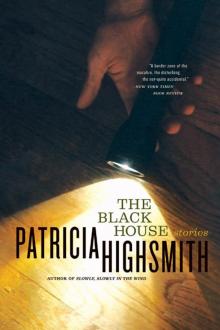 The Black House
The Black House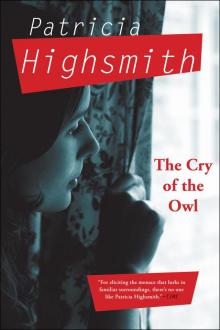 The Cry of the Owl
The Cry of the Owl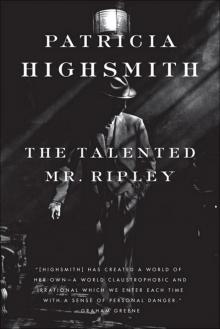 The Talented Mr. Ripley
The Talented Mr. Ripley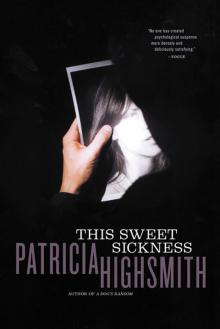 This Sweet Sickness
This Sweet Sickness The Two Faces of January
The Two Faces of January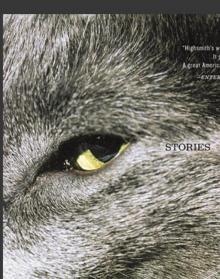 The Animal-Lover's Book of Beastly Murder
The Animal-Lover's Book of Beastly Murder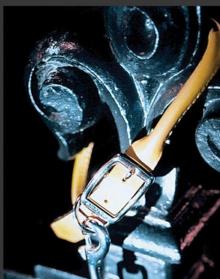 A Dog's Ransom
A Dog's Ransom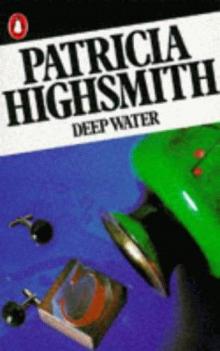 Deep Water
Deep Water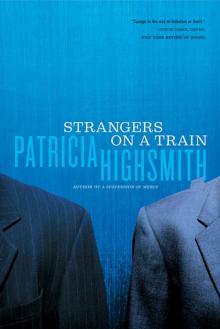 Strangers on a Train
Strangers on a Train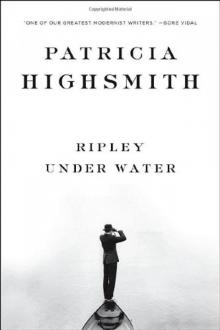 Ripley Under Water
Ripley Under Water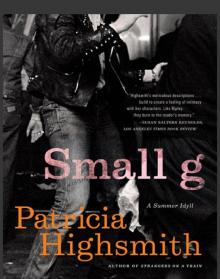 Small g
Small g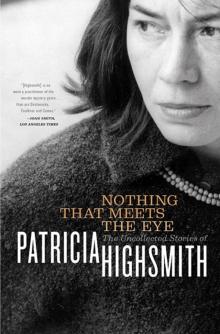 Nothing That Meets the Eye
Nothing That Meets the Eye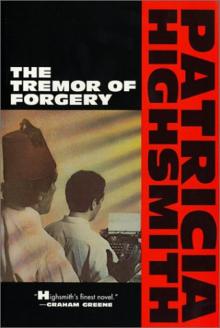 Patricia Highsmith - The Tremor of Forgery
Patricia Highsmith - The Tremor of Forgery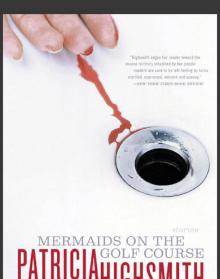 Mermaids on the Golf Course
Mermaids on the Golf Course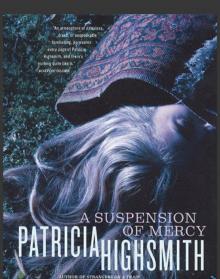 Suspension of Mercy
Suspension of Mercy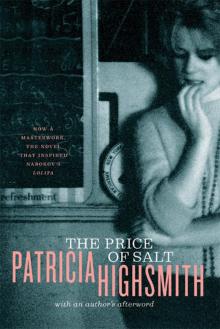 The Price of Salt, or Carol
The Price of Salt, or Carol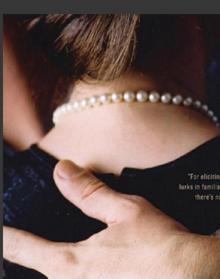 Glass Cell
Glass Cell